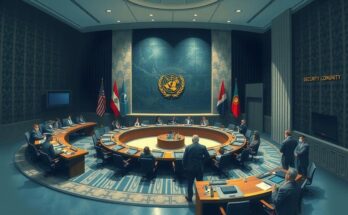Recent violence in Syria has resulted in hundreds of civilian casualties, sparking concern over sectarian strife, as reported by Archbishop Antoine Chbair. With the majority of victims being civilians, organizations like CNEWA provide critical aid while interim President Ahmed al-Sharaa promises accountability and initiates ceasefire efforts amid ongoing chaos.
In an alarming statement, Maronite Archbishop Antoine Chbair of Latakia and Tartus noted, “No one knows the end” of the escalating violence in Syria, highlighting the tragic toll of hundreds of civilian deaths since March 6. This violence erupted as the Syrian security forces clashed with armed supporters of former president Bashar Assad, who fled to Moscow in December following a rebel offensive after years of civil war that claimed over 600,000 lives.
Syria now confronts a situation that Archbishop Chbair describes as reflective of “sectarian strife”. Specifically, incidents of violence began in Latakia province, where the Alawite community resides, mirroring the composition of Assad’s regime. The majority of the Syrian population, approximately 70%, identifies as Sunni Muslims.
Reports indicate that a minimum of 800 individuals have died, with human rights organizations expressing concerns that the actual number may be greater. United Nations human rights chief Volker Türk referred to “extremely disturbing reports” detailing the killing of entire families, including innocent civilians and non-combatants, emphasizing the severity of the situation.
Civilians represent over 75% of the fatalities recorded in recent conflicts, according to the Catholic Near East Welfare Association (CNEWA). Since its establishment by Pope Pius XI in 1926, CNEWA has played a vital role in humanitarian assistance across the region by providing aid to the vulnerable, supporting health care, and addressing issues of trafficking and rehabilitation.
CNEWA’s reports indicate at least 30 targeted attacks on Alawites in Latakia and Tartus during early March. Government forces, consisting of numerous non-Syrian fighters, claim to be responding to attacks linked to remnants of Assad’s military, branding the violence as the result of “individual actions.”
Archbishop Chbair indicated that approximately 80 Christians perished during the conflicts and revealed that his parish in Banias has served as a shelter for both Alawites and Christians escaping military factions. CNEWA noted that many Alawite families are finding refuge in Christian homes and churches to avoid violence.
Sister Fadia Odisho from Tartus recounted horrific episodes of indiscriminate killings, stating that fighters failed to differentiate between innocent men, women, and children. Additionally, demonstrations supporting the persecuted were met with violence from security forces, highlighting the grim reality of the situation.
Melkite Greek Catholic Archbishop Georges Khawam described scenes of chaos, with civilians desperately fleeing the streets. He criticized the rapid and brutal nature of attacks and pointed out the pervasive lawlessness during this time of turmoil, noting that job losses and empty markets have exacerbated the crisis.
In a bid for accountability, Syria’s interim President Ahmed al-Sharaa assured that those responsible for violence will face consequences. He also signed a ceasefire agreement with the Kurdish-led U.S.-backed Syrian Democratic Forces, aiming to mitigate one area of conflict while seeking a cohesive approach to unify Syrian forces.
Syria faces devastating violence underscored by sectarian strife as civilian casualties rise. Leaders such as Archbishop Chbair and Sister Odisho report the horrific impact on vulnerable populations. Various organizations, including CNEWA, strive to provide humanitarian aid amidst ongoing turmoil. The interim president vows accountability for violence as ceasefire efforts are initiated, but significant challenges remain in establishing safety and stability in Syria.
Original Source: www.detroitcatholic.com




